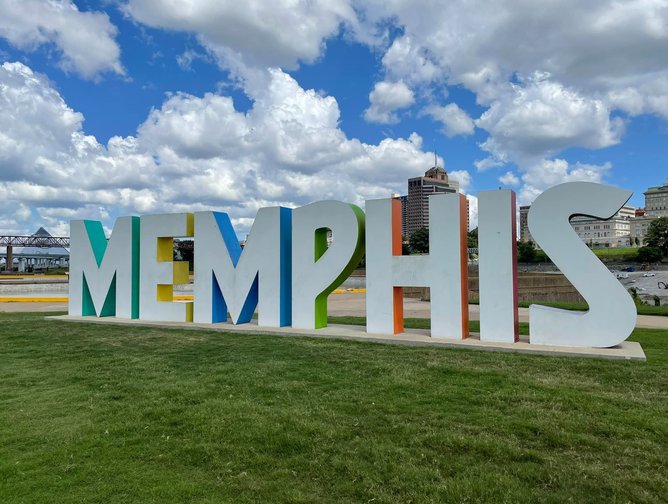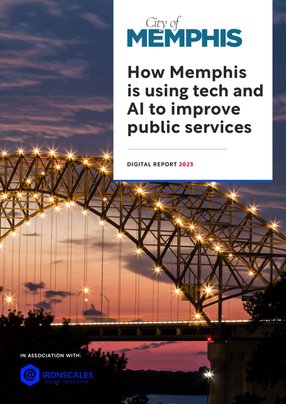How Memphis is using tech and AI to improve public services
Usually, when we speak with a leader in the field of technology or cybersecurity, the end goal is invariably profit. No matter how innovative a company might be, how groundbreaking a new product or solution, the underlying motivation is to drive profit and increase market share.
Yet when I speak with Augustine Boateng, Interim Chief Information Officer for the City of Memphis, it is a dedication to public service that shines through more than anything else. Everything that the city does from a technology and IT security perspective is done with the greater good in mind. There is no CEO here; just a directly elected mayor. There is no board of directors; the mayor answers only to taxpayers. There is no shareholder dividend; just positive outcomes.
“Public servants are in this line of work for the love of the job,” Boateng tells me from his office inside City Hall. “It’s the sense of seeing your accomplishments, and knowing that I am helping somebody even if they don’t themselves know it.”
In today’s post-COVID economy, the public sector is reflecting on how it can remain competitive in the labour market. Workers want flexibility and seem inclined to change jobs more frequently than previous generations when they don’t get it. When the employer is ultimately the public, competing for talent on financial terms is difficult. So it is often this noble commitment to the public good, to serving communities and making a difference in the real world, that holds local government together.
“The sense of fulfilment that you get from knowing your decisions will help the ordinary citizen,” Boateng continues, “is the reason why I stay in public service. It’s about giving back, and knowing your handiwork is preparing somebody to achieve the best they can with their life.”
Music heritage and a place in civil rights lore
Memphis is the sort of city that people will know for a couple of things above most else. This vibrant city of more than 620,000 people, straddling the Mississippi river on the state’s western border with Arkansas, is world-renowned for its music culture. Out of the city’s thriving music scene of the 1950s and 1960s emerged some of America’s most celebrated recording artists – including Elvis Presley, Aretha Franklin, Johnny Cash, Al Green, B. B. King, Jerry Lee Lewis, and Otis Redding.
It is because of legendary labels like Hi Records, Stax Records and Sun Records that the city was able to build up such an inimitable musical pedigree. Fitting, then, that Memphis today is home to prestigious musical institutions like the Blues Hall of Fame, the Museum of American Soul, and even Graceland.
For the less musically inclined, the name Memphis brings to mind the hard-fought battles of America’s civil rights movement. The vibe of the city, which today is more than 60% African-American, has long been shaped by black culture. It is where, in 1968, black workers from the city’s Department of Public Works striked in hope of better pay and conditions; and where, later that year, the iconic civil rights leader Martin Luther King was assassinated, after visiting the city to lend the strikers his support.
Under the tagline ‘Memphis has Momentum’, modern-day Memphis is bringing about a cultural and technological transformation that it hopes will be remembered alongside its music culture, alongside its civil rights heritage, in the decades to come. The city is preparing to welcome car maker Ford when it opens a US$5bn electric vehicle plant in the suburb of Stanton in 2025; and Memphis International Airport handles the second largest volume of air cargo in the world thanks to the presence of FedEx’s Global Hub.
Despite the upsides, the city also has its challenges. The average age is five years younger than the US median, which is typical of cities owing to their strong graduate and job prospects. Median household income is about US$44,000, according to the Census Bureau, and the city has one of the nation’s highest rates of deprivation with roughly a quarter of residents reported to be living in poverty. It is these challenges that inform and guide the City of Memphis’ technology strategy.
A diverse but economically divided community
One of the things the city is doing to deliver for its most deprived neighbourhoods lies in the provision of digital services in the community. The city extensively provides free Wi-Fi through public libraries and community centres, where residents without broadband at home can go and access the internet.
Officials are also working on expanding the availability of fibre broadband to more locations across the city, allowing homeowners to receive high-quality internet connectivity as and when they desire it. But there is still a long way to go. Pew Research Center notes a persistent ‘digital divide’, where the most affluent communities have the greatest access to technologies like smartphones, computers, and broadband internet. Indeed, there is a 36 point difference in broadband penetration between households with an annual income of less than US$30,000 and those with an income of more than US$100,000.
It comes as no surprise that Memphis – one of America’s poorest cities – also has one of the lowest internet penetration rates. According to analysis of census data conducted by Filterbuy, 83% of Memphians have internet access but just 63% have access to high-speed internet. Compare this to well-connected places like Denver and San Francisco – where the average wage is 77% and 186% higher, respectively – and it soon dawns how important connectivity is as a determinant of prosperity.
This is exactly what Boateng was referring to when he described the sense of fulfilment he gets daily from his job. Although there is a need to address the underlying causes of this financial inequality in America, the city is, in the immediate term, able to give poorer residents access to public services that they might otherwise struggle to afford.
How AI is making city government more intelligent
The city is also using artificial intelligence (AI) in a number of intelligent ways. One that regularly extracts rage from taxpayers is potholes. Previously, the city would rely on tips from members of the public, responding by sending public employees to resurface problem roads. As with many use-cases, AI is allowing this manual process to be completely overhauled.
Instead, Memphis has been tasking its public works and information technology departments with finding a technological solution to potholes. They joined forces with Google and SpringML, who suggested mounting panoramic cameras on the front of city buses. The cameras create a 360° image of their surroundings along bus routes – which, after all, tend to follow the city’s most heavily used arterial routes – and an AI algorithm helps to detect what is a pothole and what is just a change in the appearance of the road surface.
Initially, 30 days of raw footage was captured to help train the algorithm; and now the system automatically creates and assigns repair tickets to available crew members, who are then dispatched to refill the road. Not only did this make detection quicker and more effective, it has cut down on the number of man hours involved – partly because crews are no longer required to go out and verify repair requests from members of the public.
“Really, Memphis was one of the first cities in the US to do this as a proof of concept,” Boateng explains. “It worked out so well that we are now going to expand it.” This means evaluating more criteria – for example, could the system be used to detect abandoned buildings and blight – as well as increasing the amount of video capture that takes place. As well as public buses, the city has access to CCTV cameras and even dash cameras operated by the police department; these already have AI capabilities built into them, as they’re used to automatically detect fugitive number plates. Could this existing capability be better leveraged to help the local government detect, and resolve, other nuisances?
“We've been perfecting the algorithm as we go because we want to make sure that it's identifying and reporting potholes correctly,” Boateng continues. “We want to make sure that people who drive on our streets are safe, but also we want to introduce this technology as part of our governing process for the City of Memphis.”
He recognises that expansion of AI will always – for the time being, at least – provoke privacy and security concerns, particularly when it’s being used by the government. After all, the same technology that today is being used to detect potholes could inherently be used for facial recognition, which is a highly sensitive and controversial topic. Every new technology that is onboarded by the city goes is intensely scrutinised from a legal and regulatory standpoint, as well as to ensure the security and integrity of the software itself, to ensure that Memphis’ digital revolution is undertaken safely. “We do not want to infringe anybody's privacy,” Boateng assures.
Smart technology for safer streets
The city is also using AI to herald a smarter era in street light management. Before – when the only options for street lamps were ‘on’ and ‘off’ – linear decisions had to be taken about how the city’s streets were lit. But now, with the advance of technology, the city government can take a much more strategic approach.
The city is currently embarking on a huge project to upgrade and replace its existing street light infrastructure with LED smart lights – a mammoth task that involves switching out more than 77,000 lights across the entire city. Dimly lit street corners breed crime and unsociable behaviour, so ensuring that streets are lit efficiently is a priority in terms of public safety and order.
But not all street corners are equal. The amount of light needed might depend on the amount of traffic on a particular street, or whether there are any unique circumstances such as business premises that are always lit. The LED lights being adopted by the city allow it to variate the amount of luminosity used, meeting the requirements of the local environs.
Ensuring the right balance between preserving energy and providing public services – both in street lighting, and other areas – is both an environmental and fiscal prerogative. The City of Memphis has been working with an engineering company called Ameresco to remotely control street lighting, including when lights are turned on and how brightly they shine.
“Our first priority is the safety of our citizens,” Boateng says, “but we are also saving energy. That is money that we can reallocate to other projects, benefitting citizens. We are now beginning to see some savings in the amount of money that has been spent to maintain these ageing street lights.”
Consent is ultimately built on shared trust
As the city’s technology strategy becomes more sophisticated, there is hope that the public might contribute their own cameras and lights to public initiatives – especially if it allows law enforcement to reduce crime. After all, there are now billions of IoT devices in American households, including millions of smart doorbells. We are used to seeing the viral videos posted on social media: the misbehaving pets, the charming neighbour kids, the deviant delivery drivers. But could these increasingly ubiquitous devices be a new tool in the police department’s armoury?
Only with the homeowner’s consent is the short answer. The city has derived a new strategy called Connect Memphis, which uses an underlying intelligence technology provided by Georgia-based firm Fusus. Individuals and businesses that already have cameras can opt to register their device with the local police department.
When there’s a crime in the area, Fusus negates the need for officers to manually conduct door-to-door enquiries. Instead, as part of their investigation, they can request access to footage through the platform and camera owners can grant access digitally. There are already 3,700 cameras that have been registered across the city, including over 500 that have been integrated with the city’s real-time crime centre.
“It was overwhelming to see how many citizens were willing to go through this and provide access to their camera to the police department,” Boateng says, although he accepts that the majority of users at present are businesses rather than private individuals. Generally, companies have less to lose and more to gain; their premises are less likely to have privacy implications, and with revenue protection they have more to lose.
America is still grappling with how to repair relations between the public and the police; if that relationship improves, it’s plausible that more citizens will choose to register their doorbell or private CCTV camera.
“When you explain to them the benefits of it and how it helps with crime prevention, they see the importance of this project, and it has been amazing,” Boateng says.
Mitigating against growing cybersecurity risk
As cities up and down the country transition to smarter and more connected technologies, like Memphis is doing, the cybersecurity challenges grow. The risk of getting something is wrong is arguably bigger now than it has ever been.
There is, of course, a due diligence process involved in onboarding any new technology partner or supplier. “We want to make sure they’re doing all the right things before we bring them into our internal cyber management,” Boateng tells us. Typically, this process will take 8-10 weeks just to conduct due diligence and check out the supplier.
“There have been times where we decided not to go with companies because they were not mature enough, and we didn’t want to take on the risk of bringing in solutions that would affect our security posture. Balancing the technology deployment with strong cybersecurity measures is, for us, crucial to our long-term success and the resilience that we want to achieve.”
This is an issue close to his heart. Boateng, who started his career in his native Ghana, comes from a cybersecurity background. “I take security very seriously,” he tells us. As well as scrutinising every new partner and supplier, the city offers cybersecurity training twice a year to its staff.
Employees on the city’s payroll are not just administrators based at city hall; they are teachers, police officers, public librarians and street cleaners. They are young, they are old. They are technologically savvy, and they are not. Ensuring that they receive timely and accurate information about current cybersecurity threats is incredibly important, not least because the amount of data held by the city makes it a prime target for hackers.
The city also tests users randomly to see how resilient they are, as many large organisations will do. When there are shortfalls or vulnerabilities, employees are re-educated to ensure they understand the most common tactics and are aware of what constitutes risky behaviour online – like clicking on a link from an unknown source.
“We want to make sure our front gateway is as resilient as it can be, and people are able to identify phishing emails that come through or the tips and tricks that bad actors are trying to use.”
One thing that is helping to keep city employees safe online is the City of Memphis’ partnership with email security software provider Ironscales.
Boateng continues: “We adopted Ironscales a year ago, and it's been amazing how they've helped reduce the time between identifying a potential threat and resolving it. We used to dedicate hours to manually going through reported emails and following up on them. Ironscales has helped us to cut the number of man hours down by 95%.”
Using pre-defined parameters and rules, the system detects possible phishing scams and email compromises. “One thing I love about Ironscales is the community aspect of it,” Boateng continues. “Whatever other customers are seeing in their platform is aggregated and then it’s used to resolve the possible attacks in other customers.”
Local and municipal government rarely stands still. Unlike the private sector, where chief executives might remain in situ for decades, mayors come and go. Elections are fought, won, lost. The current incumbent, Jim Strickland, won two elections and will have served the maximum eight years by the time he departs. His replacement, experienced public servant Paul Young, will take office next year.
At a time that could otherwise be volatile for public servants, Boateng is reassured by the commitments that his new boss has publicly made. “We have a new mayor coming in who has expressed his plan to improve the technology for the city,” he says. “I'm looking forward to that, and I know that everything we do within the IT division is for the citizenry.





